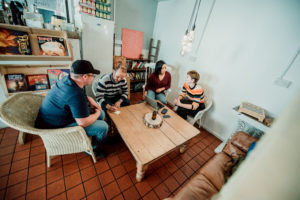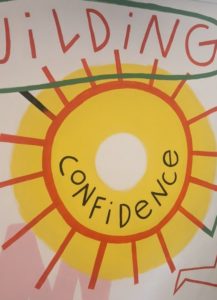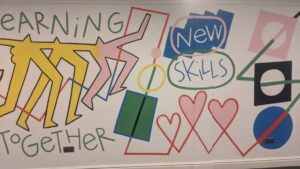“Our work is like those little, tiny stepping stones that slowly build up someone’s belief that you’re alongside them, and that they can achieve things.” Nicole Anderson, Project Z manager.
Project Z is Caring in Bristol’s project that supports young people who have come face to face with a homelessness crisis. We talked to team manager Nicole, and the respect that she has for young people is immediately evident. Not just that, but a belief in them, and a belief in the way that she and her team are working alongside them. She talks coherently about prevention versus intervention. “The opportunity for prevention is huge,” she says, “with adults it’s often about fighting fires, and it’s heartbreaking.”

However, she is optimistic that the team’s approach is giving young people the space to build better futures for themselves, rather than being buried in the onslaught of challenges that life brings. There is a clear understanding that a young person’s homelessness is not simply a housing issue. Too few of us realise there is a much bigger picture that is different for everyone.
A significant aspect of the work required of them is subtle, and this is made possible by the finely-tuned sensitivity of the team to the young people and their world view. She talks about the opportunities that they make available for them to be involved, even on a small-scale. Here confidence and self-belief are nurtured; a human quality that’s hard to quantify but inspiringly evident to the team. It brings a recent interaction to mind for Nicole where she noticed a change in a young person’s experience: “In that moment, they were owning something. They had purpose. They were not apathetic, and it’s such a little thing. But I think it’s easy to lose sight of the small things.” In a world that likes to measure things with statistics and scales, it is refreshing to know that these intricacies of everyday life are not lost in Project Z.

Working alongside young people requires a calm and patient approach. Nicole feels that many things that happen on a societal level affect them on a personal level. While it is true that supporting someone requires many problem-solving actions to be taken (a whole skill set in itself) it is also true that a positive relational approach is taken. This requires a thorough understanding of the complexities of how things sometimes are. “When young people feel angry, for example when let down by their parents, I completely recognise and acknowledge that,” Says Nicole, “However, having done family work, I’ve seen a lot of parents who have not been parented themselves, and have not had any intervention unless they’re doing something wrong. Quite often they don’t have the skills. It’s not that they don’t care about their children, they just don’t have the skills.” This can lead to young people living with uncertainty and mistrust. She is careful to frame this through the young person’s experience, and explains, “If you’re working with a young person, and they are being difficult, and being unpleasant to you, it’s because they don’t believe that you’re going to stick around. And if you walk away, all you’re doing is reaffirming that, and they prove to themselves that what they think about themselves, and their life, is right.” This is a valuable insight for all of us, as is hearing about the trust and respect between the team and the young people. It creates an inspiring backdrop of optimism for the work they do together.

It’s easy for any of us to fall into the trap of using stereotypes and myths to ‘understand’ young people, but in doing so we are enabling a society that fails to recognise their needs, talents, and potential. It creates a discouraging environment that can stop them in their tracks before they even get started. Are there things we need to push back on? “Definitely,” responds Nicole, “I think one is challenging the idea that young people are lazy, and that they don’t want to work. I think it is an absolute tragedy that we have a generation of young people that are apathetic. Imagine being 18 and feeling like ‘there’s nothing for me’ or ‘there’s no point me doing anything. I’ve got no aspirations.’ That’s not okay. And it’s a huge let-down. That is the age that you should feel like, ‘I want to do something exciting, I want to go do this, I want to do that…’” This understanding of the sometimes-unhelpful dynamics in society is part of the team’s commitment to involving the whole person and enabling them to secure long-term solutions and life-long strengths. This is confirmed when Nicole adds, “As professionals, what our idea of success is needs to change, because it’s not about our success. It’s about what a win is for a young person.” There is no kicking the can down the road in Project Z; instead, every effort to co-create an authentic journey.
Nicole is clear that every interaction is a stepping stone that builds up someone’s belief. She understands the necessity for solution-focused work but knows that this needs to sit within a restorative approach, helping a young person heal and recover lost ground. “That’s how you help someone to understand everything’s not their fault, and it’s alright to be angry. You need to let yourself have those feelings when things are not okay. You’re allowed to. It’s going to pop up at some point if you don’t let yourself feel angry about it. It’s detrimental to you, and you’re behaving in a way that’s self-damaging, but working with it is part of the process of healing.” This reflects the firefighting faced by many adults that Nicole has already mentioned, but instead the team create a safe space for young people to extinguish the flames before they take hold and cause permanent damage.
Project Z is restoring hope and autonomy in partnership with its young people. It is supporting them to map out a better future, one big or small solution at a time. Most of all, it is creating a place of safety that nurtures mutual respect, confidence, and self-determined transformation. For many young people this approach to youth work will be a radical departure in their life, and one which they will take into all their future encounters. Nicole knows that society must change its thinking towards young people for them to truly thrive. “We have an opportunity to change the culture,” she says, “which will also impact the young people we work with. And that’s a beautiful thing. Being part of that change feels very important to me, and something that I am really proud of.”
